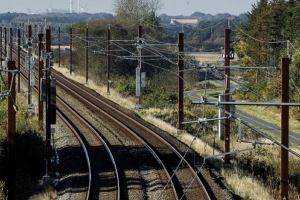News
The train now standing at platform seven – might be delayed yet again
This article is more than 7 years old.
Denmark is in the process of electrifying the rail network to prepare for a greener future, but the new technology chosen is untested and may end up being costly

Things rarely seem to go smoothly when it comes to modernising the Danish railway network (photo: Banedanmark)
As part of the process of reducing CO2 emissions and making Danish transport greener, diesel locomotives are to be phased out as soon as a suitable electric alternative is available.
READ ALSO: Government gives go-ahead for electric locomotive purchase
So far, so good. But it now seems as if the new technology for the electric power cabling system that has been ordered from Siemens by track operator Banedanmark has only been properly tested on a 4 km stretch of railway in Hungary, reports Ingineøren.
Another leap of faith
No other countries have dared to sign contracts for it as yet, and a number of experts are surprised that once again Denmark is prepared to be a ‘guinea pig’ when it comes to new technology after the debacle of the IC4 train.
There have also been severe problems with the new signalling system ERTMS, where a standard has been chosen that no other country uses in the same way.
Denmark has around 1,300 km of railway and the new system is cheaper because there is a greater distance between the masts supporting the electric cables than usual – up to 110 metres. At present, in Denmark and abroad the distance is a maximum 60 metres between masts.
Things have already gone awry on the first stretch between Esbjerg and Lunderskov. A cable fell down in April and the same thing happened on a stretch of track between Copenhagen and Ringsted on May 11, leading to Banedanmark closing the track for electric trains. On top of that, 320 of the pulley wheels the cables travel over will also have to be replaced. According to Siemens, this is due to a production error.
An unpleasant surprise
Tommy Jensen, who has previously lectured on electrification at the Technical University of Denmark (DTU), told Ingeniøren that he expects Siemens will solve the problems along the way, but is surprised that Banedenmark has chosen a new system without testing it first.
“Denmark is going to act as a test-bed for Siemens’ new system. I don’t think that politicians in their wildest dreams had imagined that we were going to play host for experiments with electrification,” said Jensen.
It seems as if the transport spokespersons in Parliament have not been informed of Denmark’s leading role.
“This is absolutely ridiculous and especially grotesque because for several years now we’ve been saying that the Danish railway system should not be subject to more experiments,” said Enhedslisten’s transport spokesperson, Henning Hyllested.
“It’s certainly also taken me by surprise that we are again experimenting, but unfortunately not that Banedanmark can’t get things to work,” added Kim Christiansen, the spokesperson for Dansk Folkeparti.
“I couldn’t care less how they put the cabling up – as long as the crap works. It seems as if there are some people out there who want to try out a bunch of things at the taxpayer’s expense,” he added.
The Transport Ministry has commissioned an independent report into the project that should be finished by October.










































